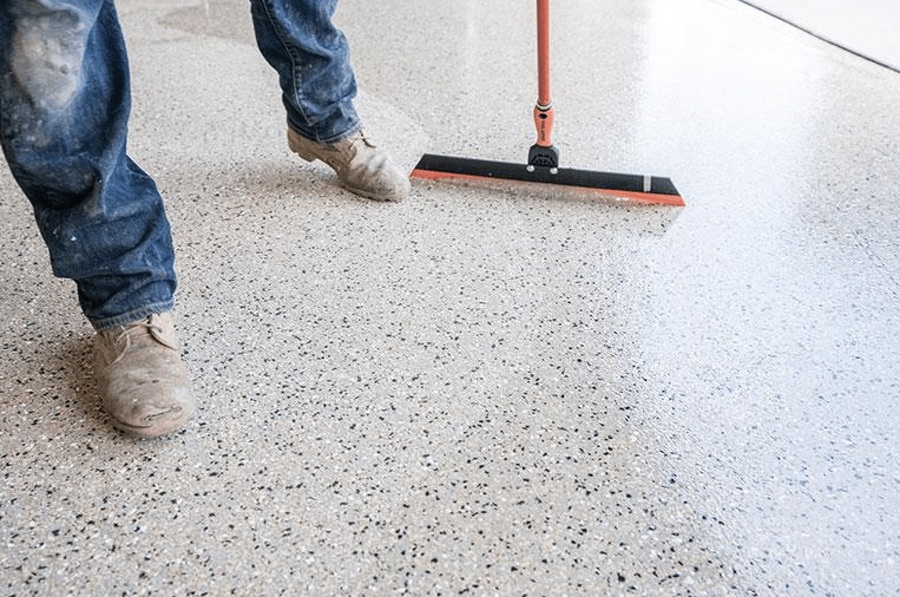Understanding the Types of Garage Floors
Before we delve into maintenance practices, it’s essential to understand the common types of garage floors, as their maintenance requirements vary.
- Concrete: The most common type, known for its durability and strength.
- Epoxy: An attractive and durable coating applied to a concrete floor.
- Tiles: Plastic or rubber tiles can be a comfortable, versatile choice.
Cleaning Techniques
Regular cleaning is the first step in maintaining your garage floor’s longevity and cleanliness. Here are techniques specific to each floor type.
Concrete Floors
Routine Sweeping: Regularly sweep your concrete floor with a push broom to remove dust and debris.
Deep Cleaning: Conduct a deep clean every few months using a power washer or mop with a concrete cleaning solution. Make sure to remove any lingering moisture after cleaning to prevent mold growth and potential damage.
Epoxy Floors
Dry Cleaning: Epoxy floors resist dust, so a simple dust mop or soft indoor broom will do for weekly cleaning.
Wet Cleaning: Use a hard foam mop and a mild, non-acidic cleaner for a more thorough monthly clean. Avoid soap-based cleaners as they can leave a residue.
Tile Floors
Vacuuming: Regular vacuuming can easily remove dust and debris trapped between tiles.
Washing: Periodically wash the tiles with mild detergent and warm water. Rinse thoroughly and dry the tiles to prevent water seepage and damage.
Stain Prevention
Stains are inevitable in a garage, but certain measures can help prevent permanent damage.
Spill Management
Respond promptly to any spills, especially oil or chemicals. Use a combination of cat litter, baking soda, or a commercial absorbent to soak up the spill, then clean the area with a high-quality degreaser.
Protective Coatings
Protective sealants for concrete and epoxy floors create a barrier against spills and stains. They need re-application periodically, so check their condition during your regular cleaning routine.
Regular Maintenance Routines
A proactive maintenance routine is key to extending your garage floor’s lifespan. Here are some tips:
Inspecting for Damage
Regularly inspect your floor for signs of damage, like cracks or chipping in concrete or peeling in epoxy. For tiles, look for warping or loose pieces. Early detection and repair can prevent more severe, costly damage in the future.
Sealing Concrete Floors
Concrete is porous and can absorb spills, leading to stains and damage. To protect your floor, apply a high-quality concrete sealer every 2-3 years.
Maintaining Epoxy Coatings
Epoxy coatings can wear over time, especially under heavy traffic. To maintain the coating, you can apply a new topcoat every few years. Also, avoid dragging sharp or heavy objects across the floor to prevent scratches or peeling.
Caring for Tile Floors
Tile floors generally require less maintenance, but the tiles can become loose or damaged. Regularly check for problem areas and replace tiles as needed.
Garage Floor Upkeep: A Long-Term Investment
A well-maintained garage floor is more than just an aesthetic choice; it’s an investment in your property’s longevity. By implementing these cleaning techniques, stain prevention measures, and regular maintenance routines, you can keep your garage floor in excellent condition for years to come.
Remember, consistency is vital when it comes to maintenance. By taking a few hours each month to take care of your garage floor, you’ll avoid potentially expensive repairs down the line and preserve a vital aspect of your home.
Ultimately, maintaining your garage floor’s cleanliness and longevity is not just about preserving a physical space. It’s about creating an environment where functionality and cleanliness coexist, allowing you to get the most out of your garage, whether you use it for storage, as a workspace, or to protect your vehicles.
Key Takeaways:
- Garage floors, including concrete, epoxy, and tile, require regular maintenance due to constant exposure to wear and tear, dirt, chemical spills, and heavy vehicles.
- Regular cleaning is vital. For concrete floors, routine sweeping and periodic deep cleaning is recommended. Epoxy floors need dry cleaning with a dust mop or soft indoor broom and occasional wet cleaning with a mild, non-acidic cleaner. Tile floors can be maintained by regular vacuuming and washing with mild detergent and warm water.
- Prevent stains by promptly managing spills using absorbent materials like cat litter, baking soda, or commercial products. Applying protective sealants can also help prevent permanent staining.
- Implement a proactive maintenance routine that includes regular inspections for damage, resealing concrete floors every 2-3 years, maintaining epoxy coatings with new topcoat applications every few years, and checking for problem areas in tile floors.
- Regular maintenance of your garage floor is a long-term investment that can save you from costly repairs and preserve the longevity of your property. Consistency in maintenance is key.
- A well-maintained garage floor enhances the functionality and cleanliness of the space, adding value to your garage whether it’s used for storage, as a workspace, or to shelter vehicles.


Recent Comments